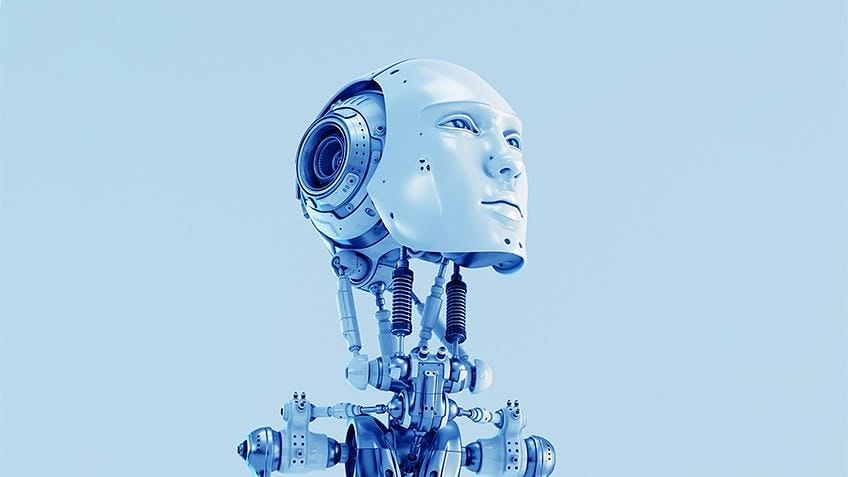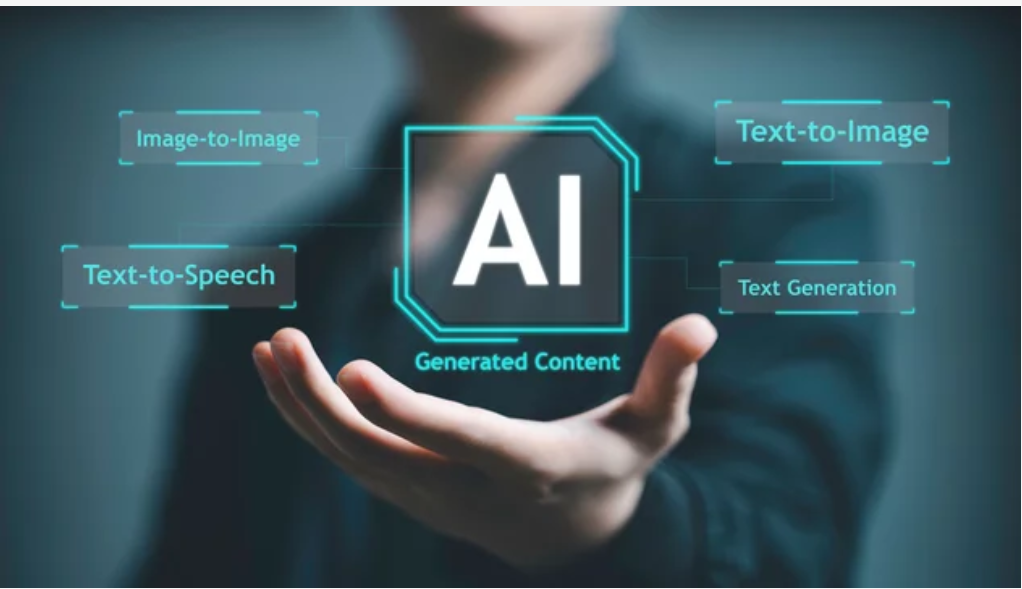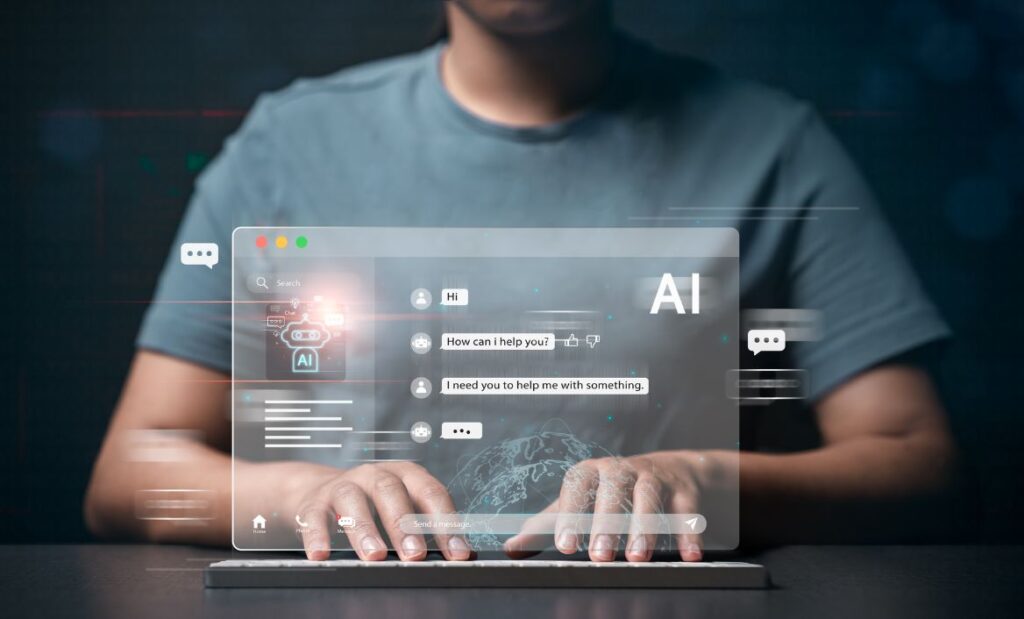How AI Will Shape The Future Of Content Creation
Imagine a world in which the creation of content is an unidirectional combination of human creativity and modern technology. The future is fast moving closer, thanks to advances made in the field of Artificial Intelligence (AI). From writing articles to creating images and even creating songs, AI could change the way we create and consume media. What exactly do you think AI influences the future of content creation? Let’s take a look and investigate this intriguing topic together.

Present Situation of AI for Content Creation
At present, AI is already making waves in the content production world. You’ve likely encountered AI-generated content, and you may not even realize it. Tools such as OpenAI’s GPT-3, which powers applications such as ChatGPT, are capable of creating articles and posts for social media as well as composing poetry. Other tools, like Grammarly, can help us improve our writing by recommending improved grammar and style, and platforms such as Canva make use of AI to aid in graphic design.
Essential AI Tools In Use Today
- GPT-3 and other Language Models: These models create text based on questions, generate summaries, and even answer questions.
- Writing Assistants and Grammarly AI devices assist in improving the style, grammar, and coherence of writing.
- Canva and Design Assistants: AI-powered applications that assist in the creation of visual content by recommending templates and designs.
- Video Content Creator Tools AI instruments that aid in editing or creating video content, including Magisto and Lumen5.

The Future Impact of AI on Content Creation
AI’s contribution to content creation will only continue to grow. Here are some ways that AI will impact the future of the creation of content:
- Automated Content Generation
Imagine a virtual assistant who could write blog posts for you or draft emails and even write social media posts for you. AI can handle all of these and more. Automated content generation can help us save time and allow us to concentrate on more important tasks.
For example, News agencies like the Associated Press and Reuters already make use of AI to create sports summaries, financial reports, and sports summaries. These AI systems can process data and create consistent, publishable articles in a matter of seconds.
- Personalized Content
Have you noticed that Netflix appears to know precisely what you’d like to watch the next time? This is AI working, analyzing your preferences and habits to make recommendations based on your preferences. This same technology can be utilized to create highly customized content that is targeted to your audience, which will increase engagement and satisfaction.
Example: Amazon uses AI to provide personalized recommendations on products based on the history of browsing and purchasing and improve the shopping experience while driving sales.
- Enhanced Creativity
Consider AI in terms of a playful collaborator that never runs out of ideas. If you’re a writer, musician, or designer, AI can assist you in overcoming your creative blockages and improving your work. For example, AI can suggest plot ideas, create dialogue, or even design artwork.
A good example is Adobe’s AI tool, Adobe Sensei, which helps designers by offering design suggestions while automating repetitive tasks, allowing time to work on more creative projects.
- Improved Quality Content
Wouldn’t you love to have an instrument that not only examines your grammar but also ensures that your content is 100% correct and free of plagiarism? AI can help you with that. AI can improve content quality by offering guidelines on grammar and style exa, mining for plagiarism, and verifying the accuracy of the information.
Grammarly employs AI to provide real-time grammar, spelling, and style advice, which helps writers write precise and error-free material.
- Email marketing – Email marketing is another effective way for businesses to connect with new customers and increase sales. This marketing channel sends marketing emails to selected groups of subscribers. These emails can be personalized and targeted to specific customer groups based on their interests, demographics, or purchase history. Email marketing helps businesses build strong relationships with their customers and increase sales.
In summary, having a web presence is essential for businesses in today’s digital age. It provides businesses with new marketing options and the ability to reach a wider audience. By leveraging internet marketing channels such as SEO, PPC advertising, and email marketing, businesses can affordably connect with new customers and increase sales.

Ethical and Moral Challenges
Naturally, with tremendous power comes the responsibility of a great leader. Although AI provides numerous advantages in the creation of content, it also poses problems and ethical issues.
- Bias in the form of Fairness
AI algorithms learn by studying data, and if the information is biased, then the AI could produce content that is unfair or biased. It’s essential to make sure that all data used in training AI is as objective and as accurate as possible.
ExampleA: The language models that have been trained using biased datasets could create content that perpetuates stereotypes or discriminates against specific groups.
- Originality, Plagiarism and Originality
AI-generated content raises questions about originality. What can we do to ensure that the content generated by AI is genuine and not a re-interpretation of material that has already been created?
For example, an AI tool could generate an article that is very similar to the content of other sources, resulting in possible plagiarism problems.
- Job Displacement
As AI is able to automatize many tasks, there’s an issue with job displacement for designers, writers, and other content creators. However, AI can also create new roles and opportunities that weren’t available prior.
Example: Although AI could help reduce the need for certain writing jobs at the entry level, it also opens up new jobs for AI tools, strategy for content, and AI control.
- Ethical Use of AI
It is essential to make sure that AI is ethically used in the creation of content. This includes being open regarding AI-generated content, adhering to copyright laws, and staying away from the use of AI to create false and harmful material.
Example A clear labeling of AI-generated content may aid in maintaining transparency and confidence with viewers.

The Future of Work for Content Creators
What do these developments mean for creators of content? The introduction of AI in the creation of content will certainly alter the face of work; however, it doesn’t need to be negative.
- Collaboration with AI
Content creators will collaborate with AI tools, using these tools to increase productivity and creative thinking. This collaboration will allow creators to concentrate on more complex tasks that require human understanding and judgment.
For example, Writers can employ AI to write their first drafts of their ideas or come up with ideas, allowing writers to concentrate on refining and perfecting their text.
- New Skills Sets
When AI technology becomes more commonplace, content creators will need to learn new skills to make effective use of these tools. This means knowing how AI operates in data analysis, as well as the ability to use AI-powered tools.
Example Graphic designers may have to master the use of AI-powered design tools in order to create better and more innovative designs.
- AI Content Moderation
With the increasing use of AI-generated content, there will be an increasing requirement for human supervision to ensure the ethical and quality usage of AI. Moderators of content will play an important role in checking the accuracy and appropriateness of AI-generated content.
For example, News agencies could employ content moderators to check information and verify the authenticity of news articles created by AI.
Conclusion
AI is expected to change what’s next in content production significantly and will bring many benefits, like the ability to automate, individualize, and improve quality and creativity. However, it also brings ethical issues that need to be dealt with. As AI is evolving con, tent creators must be able to change, learn new abilities, and work in conjunction with AI tools. The future of creating content is exciting, bringing the combination of human imagination and AI technology.